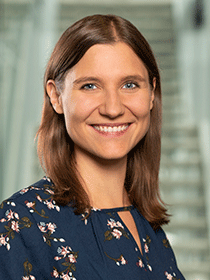-
Graduation
Master of Arts (Continuing Education) - MA (CE)
-
ECTS-Points
120
-
Learning format
-
Duration
8 semesters, part time
-
Start
6 April 2026
-
Costs
EUR 12.000,--
-
Admission requirements
Bachelor's degree and professional experience
-
Language
German
-
Curriculum
/Headerbilder/Headerbilder-Refined/Master-Überlauf-extended-(300dpi).png/jcr:content/Master+%C3%9Cberlauf-extended%20(300dpi).png)

"...game studies have so far been an inclusive field. It is unified by a certain pioneering spirit, and the understanding that the underexplored nature of games leaves room for all those interested."
Simon Egenfeldt-Nielsen, Jonas Heide Smith & Susana Pajares Tosca: "Understanding Video Games. The Essential Introduction" (2019), p.13
Any questions?
We are here to help.
Karin Kirchmayer
Administrative assistant
Studying all facets of games & play
As a highly interdisciplinary field, Game Studies can connect to a wide range of practical and professional domains. Games (and play) can be at the center of professional endeavors; they can be means of expression and meaningful communication; and they can manifest and transform the social, economic, or cultural implications of new technologies.
The study program aims to enable students to explore the field of Game Studies along the following dimensions:
- Games as a medium
- The impact of games
- Games and society
- Games, Play & Culture.
In addition, students choose two of the following specializations*, for a total of 24 ECTS credits each:
- Game-based Education
- Game Design: Theories & Applications
- Emerging Technologies
Individual specialization can take into account special professional priorities, objectives or competencies, and can be customized in agreement with the head of the study program.
Furthermore, students
- engage with and reflect on the specific methods of arts and cultural studies.
- apply gender & diversity perspectives to critically reflect on topics within Game Studies.
- conduct autonomous projects on self-selected topics related to their own current or aspired professional practice.
*Each of the specializations can also be studied independently in the form of a Certificate Programs (CP) with a total of 24 ECTS. Completed Certificate Programs can be credited for the Master's program, both in terms of content and funding.
-
for working professionals
-
interdisciplinary
-
specializations
Target Group
The Master's program "Game Studies MA (CE)" addresses all persons with a (predominantly professionally related) interest in academically grounded continuing education in the field of "Game Studies". Due to the variety of electives and the individual specialization option, the program can be combined with a variety of professional and subject areas. These include (but are not limited to) game development, media work, schools and education, journalism and public communication, arts and culture, as well as a wide range of academic research disciplines.
Curriculum
Compulsory subjects "Game Studies Fundamentals" can also be attended as an independent Certificate Program (CP). Please click on the title of the CP to find out more about the program.
Orientation
-
Contents
The module serves as an introduction to the study program and research area "Game Studies". Students gain an overview of the research field, are made familiar with the structure and requirements of the study program and formulate their expectations and (preliminary) goals for their further studies and (if applicable) for their further professional development.
In the Master's degree programme, students choose two specialisations (Study Foci), each comprising 24 ECTS credits. The specialisations can also be attended as independent certificate programmes (CP). Please click on the title of a CP to find out more about the program. Alternatively, an individual specialisation (24 ECTS) can be arranged in consultation with the course manager. This can consist of modules from the range of electives offered by the Center for Applied Games Studies (internal qualifications) or courses from other educational institutions, non-formal or informally acquired learning outcomes (external qualifications). Internal and external qualifications can also be combined. However, the individual study specialisation must include a research or practice project.
Methods of Arts & Cultural Studies
-
Contents
Based on practical examples and exercises, functional, formal as well as stylistic aspects of academic writing in the context of art and cultural studies are discussed. Students learn to apply these methods independently. In addition, the significance of these methods for academic work, particularly in the field of art and cultural studies, will be reflected on.
-
Contents
The focus of the module is on the self-study course "Digital Competencies", which teaches the fundamentals of academic work in a digital environment.
Special consideration is also given to new technologies such as Artificial Intelligence applications, on how to approach them, and on reflecting their potentials (and limitations) for arts and cultural studies.In addition, the differences between various literature management programs will be discussed and students will select a literature management program according to their own demands and create a literature database for their academic work.
-
Contents
The module covers the most important critical approaches in 20th and 21st century cultural studies, their significance for discourses of social and cultural criticism and their applications, particularly in arts and cultural studies. Special consideration will be given to theories and discourses relating to social constructions of inequality (in particular gender & diversity, class, "race", with due regard to intersectional aspects) as well as to the associated critical approaches (e.g. feminist, queer, Marxist or postcolonial criticism).
The module does not aim to fully depict the diversity of critical approaches. It rather aims to create an awareness of the fact that in the field of cultural studies, the raised questions, research processes and outcomes are not independent of social contexts, discourses and normative mechanisms.
-
Contents
The module highlights the importance of methodological diversity as a defining characteristic of arts and cultural studies as a field of research.
Particular attention will be given to foundational as well as contemporary discourses on interdisciplinarity and transdisciplinarity. A limiting understanding of arts and cultural studies as a field of research defined by a narrow set of particular methods will be called into question. Wherever feasible, the topics covered will be introduced, exemplified and discussed based on existing research projects. -
Contents
A main focus of the module is on the specific methods that arts and cutural studies have devised for handling sources (texts, images, objects, pieces of music, films, games, etc.) and on source criticism as an essential basis for cultural studies work.
Another focus is on the discussion of strategies for dealing critically with information in an increasingly digitized society, and on identifying the potential of source-critical methods of arts and cultural studies for the development of media competence / (digital) media literacy.
The following topics are of particular concern:- The handling of sources as a central feature of arts and cultural studies
- The critical analysis of sources, information, media and materials, particularly in relation to concepts of authenticity, originality and truth
- Aspects of the production and dissemination of knowledge (with an emphasis on arts and cultural studies)
Master Thesis Project
-
Contents
The "Master Thesis Colloquia" module is designed to provide structured support for the master thesis in the form of a research plan and feedback from supervisors and peers.
Distance Learning in English
Distance learning formats for all our study programs (in English) are currently in preparation. The first distance learning programs are scheduled to start in fall 2025. Check back here if you are interested, or fill out our enquiry form (see below) so we can keep you up to date. In the meantime, you may want to explore our study program in German.
Enquiry form
Please use our enquiry form to contact us, order information material or register for the mailing list with news from the Center for Applied Games Studies.
open enquiry formStudy Program Director
Tags

